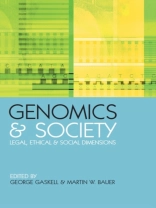The impact of genomics on society has been the focus of debate and conflict across the world. Contrasting views of risks and benefits, trust in science and regulation, the understanding of science, media coverage and mobilization of the public by civil society groups all have been cited as drivers of public opinion. The long running controversy is a signal that the public”s view cannot be ignored in the development and implementation of new technologies arising out of genomics such as agricultural biotechnologies, genetic testing and the uses of genetic information, the cloning of human cells and tissues and transgenic animals.
Written by a progressive international group of social scientists from Europe, North America and Japan, this volume presents a series of comparative perspectives on the social, ethical and legal implications of genomics. The result is a book which encapsulates the lessons to be learned from the controversies of the 1990s and raises the level of debate on the societal implications of new developments in genomics.












